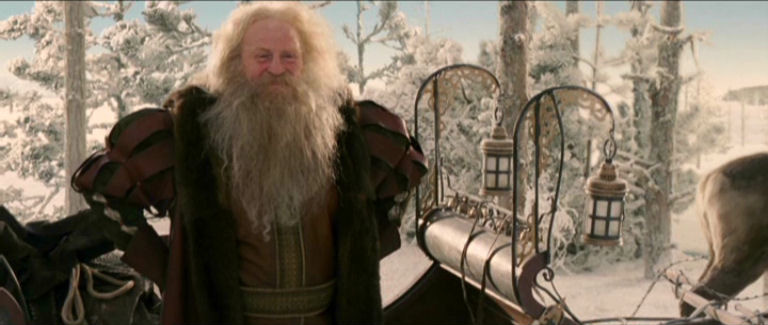‘Jesus vs. Santa’ Notions Are Stuff and Nonsense
Why do some Christians insist on pitting Santa vs. Jesus Christ the Hero of Christmas, when they wouldn’t do the same with any other good gifts in their families, churches or cultures?
Today I found this inconsistent, glum, and Gospel-reductionistic perspective on Santa as displayed by John Piper, in a micro-podcast and its transcription called “Rethinking Santa.”
Piper is a now-retired pastor and current author, most famously of the book Desiring God: Meditations of a Christian Hedonist.1 But his thoughts on whether Santa Claus can be a part of Christmas celebrations (hint: no) aren’t very Christian-hedonistic.2
Jesus vs. Santa: Piper’s false dichotomy
It is mindboggling to me that any Christian would even contemplate such a trade, that we would divert attention away from the incarnation of the God of the universe into this world to save us and our children.
This warning is needed for Christian parents or children who are careless about Christ and act as if good things like legends, games of pretend, and material gifts are a sinful replacement “chief end of man,” even for a day or a season.
But why insist that this is the only way Christians would use Santa?
Does every Christian parent or even the majority of Christian parents enjoy Santa games for idolatrous reasons, as only unhealthy competition to Christ? That isn’t how I saw him. When I was a child, my parents presented Santa (intentionally and otherwise) as a symbol of the bountiful gifts in Christ. Santa was not a “trade” but an effective delivery service for a few small things that also show the Savior’s bountiful love. He gives every good gift, though these gifts must be made holy through the word and prayer (1 Tim. 4:1–5).
Not only is Santa Claus not true — and Jesus is very truth himself — but compared to Jesus, Santa is simply pitiful, and our kids should be helped to see this.
This warning is needed for any Christian parents who have a low or un-biblical view of the amazing Hero, Jesus Christ, Who is absolutely the central Figure of Christmas.
But shall we apply this same warning for all Christians, presuming they are so immature that they cannot handle other heroes, real or imaginary, lest they distract from Christ? What if we said, “Compared to Jesus, Charles Spurgeon is simply pitiful.” “Compared to Jesus, Aslan of The Chronicles of Narnia is simply pitiful.” “Compared to Jesus, John Piper is simply pitiful.” “Compared to Jesus, Bilbo Baggins of The Hobbit is simply pitiful.”3 And what about other good gifts of Jesus? Compared with Him, food is pitiful, married romance and sex is pitiful, children are pitiful, church politics are pitiful.
Yes, all these are true! But do we only ever issue dour warnings about these gifts? This is an overly self-abasing “worm theology” way to live, as if under constant suspicion that mature Christians are still totally depraved and cannot enjoy gifts lest they distract from Jesus. Yes, these can distract from Jesus. But the best way to prevent this is to see gifts as His gifts.
Santa Claus offers only earthly things, nothing lasting, nothing eternal.
This warning is needed for Christians who haven’t been learning, or teaching their children, an eternal perspective that is informed by Scripture.
But what about parents who are teaching this? Do they not have freedom to enjoy (or not enjoy) holiday traditions and myths?
Jesus offers eternal joy with the world thrown in — the fire engine is thrown in (1 Corinthians 3:21–23).
I’m unsure what Piper means by “the fire engine is thrown in.” If this is an allusion to Christmas gifts, such as toy fire engines, then this is just how Christian parents can (and some already do) enjoy Santa as part of their Christ-exalting holiday celebrations.
Santa Claus offers his ephemeral goodies only on the condition of good works: “He knows when you are sleeping, he knows when you’re awake, he knows when you have been bad or good, so be good for goodness’ sake.” That is a pure works religion. And Jesus offers himself all the gifts freely, by grace, for faith.
This warning is certainly needed for Christians who effectively run their homes according to works-righteousness religion (and there are far too many of those).
But who decided that Santa-celebration must always be paired with the “making a list and checking it twice” notion? Last I checked, there is no civil or religious statute that forces parents to accept the whole popular-culture package. Rather, if they want to enjoy Santa as part of their Christ-exalting holiday celebrations, they have the freedom — and I would argue, they also should — to reject the works-righteousness part and embrace the lavish-giving-and-grace part. It turns out many popular adaptations of the Santa story do this already.4
Santa Claus only shows up once a year. […] Santa Claus cannot solve our worst problem. […] Santa Claus is not relevant in many cultures of the world.
This warning is needed for any Christians who sinfully promise their children that Santa is actually omnipresent, or that Santa is the solution to our worst problem of rebellion against God, or that Santa is a global phenomenon.
But where are those people?
Many Christian parents are certainly careless about their Santa presentations. Children will fill in the gaps with all manner of notions and imaginations. Children can lose track of what’s fantasy and what’s reality. But even in that case, Piper again presumes parents are incapable of enjoying the Santa legend but also in perspective. Parents can teach: “‘Santa’ is one of Jesus’s little helpers.” It’s easy — if your children are able to listen and enjoy, rather than abuse the fantasy into an idol. If your children make it an idol, then re-evaluate.
Santa Claus will be forgotten some day and Jesus “is the same yesterday and today and forever” (Hebrews 13:8).
This warning is needed if parents, in belief or practice, uphold Santa as equivalent to Jesus.
But why presume that Santa Claus will be forgotten someday?
For my part, I will always remember how God used the Santa fantasy to impress on me the wonder and joy that is ultimately found in Him alone. I will always remember Christmas, Santa and gifts and all, as an extra-special time to celebrate God’s gifts such as family and toys and celebrate the Giver in His human incarnation. I will always remember everything, come to think of it — even if Santa did turn out to be evil! No Scripture says that, as George MacDonald said, Christians will be greater fools in eternity than we are here. Rather, in Heaven (and then the New Earth, Rev. 21), redeemed saints will begin to see how God used everything — gifts, abuses of gifts, sins, and good acts alike — as part of His Story.
Father Christmas, servant of Aslan
Oddly enough, one of the best ways to start seeing Santa and any other cultural legend in light of the Gospel, is taught in the 2013 Desiring God conference messages about the life and beliefs of C.S. Lewis. Lewis believed that even pagan myths can reflect the True Myth. Piper himself credited this view in his messages “C.S. Lewis, Romantic Rationalist: How His Paths to Christ Shaped His Life and Ministry,” and “What God Made Is Good — And Must Be Sanctified: C.S. Lewis and St. Paul on the Use of Creation.”
Despite knowing this in other “departments,” Piper concludes about the Santa “department”:
I cannot see why a parent, if they know and love Jesus, if they have found Jesus to be the greatest treasure in the world, why they would bring Jesus out of the celebration and Santa into the celebration at all — I mean, he is just irrelevant. He has nothing to do with it. He is zero.
Honestly, this is even worse reductionism. It’s plain personal opinion, possibly one that is stigmatized by some parents’ sins and abuse of the tradition. But it is neither consistent with Piper’s own approval of Lewis’s “redeeming pagan myths” views, nor with Scripture.
Piper’s own effective mentor, C.S. Lewis, showed exactly how Christians can bring Santa into the celebration of Jesus Christ.
In The Lion, the Witch and the Wardrobe, Father Christmas finally enters the frozen land of Narnia that his master, Aslan, has begun to thaw. Father Christmas reflects the traditional figure 100 percent. He has a sleigh with reindeer, a sack full of gifts, and magical abilities including the power to enter locked rooms and leave gifts. But he also serves Aslan, Narnia’s king, as Aslan’s noble follower. In fact, if Aslan is a type (the better term is supposal) of Christ, then Father Christmas is a type of Aslan.
 Father Christmas provides for the children’s and the Beaver couple’s immediate needs.
Father Christmas provides for the children’s and the Beaver couple’s immediate needs.
Father Christmas even provides a small feast, hearkening to future celebration of victory.
Father Christmas distributes gifts that are wonderful yet also suited to each child’s abilities and real-world callings. I love it when he says, “These are tools, not toys.” Some of the best gifts I can remember as a child were just that: tools, not just toys. I still have many of them.
Father Christmas honors Aslan as his own lord and savior. As he leaves he shouts, “A Merry Christmas! Long live the true King!”5 — honoring, yet redeeming, the original legend.
Go deeper
Over the past years of Christmases at SpecFaith we’ve had much to say about Santa Claus.
Our latest will be I Believe in Father Christmas, coming this Friday from Timothy Stone.
Here’s a preview of this wonderful article:
There, in that small Air Force chapel in Kuwait, we shut off the lights, took lit candles, and passed them around. In hushed tones, we began to sing “The First Noel.”
I remember looking around as I sang, looking at everyone’s faces faintly illuminated by the candles that we all held. So many different denominations, believers and lost alike, and countries of origin, were represented. Yet here we were, on Christmas Eve, thousands of miles from home, and we were all happy. Most people would wonder at that, that joy that we all seemed to feel that night, given where we were, but I know it was really what was in our hearts.
That is when I believe I saw Father Christmas — when I saw Santa Claus.
See also:
- Don’t Ditch Santa, parts 1 and 2, by Timothy Stone. Part 1: “Scripture and history prove pagans don’t own Santa. The early Church does.” Part 2: “St. Nicholas began as a Christian symbol. Let’s celebrate him, not shun him.”
- Rejection of Santa is Cause for Grief. Excerpts from S.L. Whitesell’s article “Why You Should Believe in Santa Claus Even If He Doesn’t Exist” at Christ and Pop Culture.
- Redeeming Santa Legends for Delighting in Grace, by yours truly. “At Christmas, when it comes to Santa and other issues, do reflexive ‘we’re to be different’ lines jump to our minds? We need to balance that half-truth with enjoyment of God’s good gifts — including celebrating holidays and feasting, which Scripture does support, for God’s glory.”
- If you’re unfamiliar with that latter pagan-sounding phrase, Piper likes to redeem the phrase “hedonism” in the biblical context: Christ is the only source of joy, and Christians are saved to glorify Him, enjoy Him, and worship Him in all things — even hardships, suffering, and death. ↩
- I must concede that as an overall John Piper fan, I’m glad he isn’t right all the time. Otherwise I suppose Christians would have even more trouble with their “celebrity pastor” problems. ↩
- Here’s Desiring God’s recent article that is more favorable to Bilbo and his tale, and not constantly issuing warnings. ↩
- I’m thinking of the movie The Santa Clause 2, in which Santa (Tim Allen) must find a Mrs. Claus before Christmas Eve, and the elves create a life-size toy Santa to do the real Santa’s work for him. In true evil-clone-or-robot fashion, the toy Santa goes into full dictator/Ultron mode, deciding that every child is so bad that they must all receive lumps of coal for Christmas. Even in this simple, silly holiday film, Clone Santa is a clear contrast to the gracious, giving, and genuinely loving “true” Santa Claus. ↩
- I’m indebted to S.L. Whitesell for the example and the link in his excellent article “Why You Should Believe in Santa Claus Even If He Doesn’t Exist” at Christ and Pop Culture. ↩































Great piece Stephen. I think the ironic thing is that Piper couldn’t be more wrong. Not only is Santa so prevalent in America and increasingly world-wide, but other versions of St. Nicholas are revered (and have been historically) almost in more and more parts of the globe as time goes on.
Other than Mary the mother of Our Lord, St. Nicholas is probably the most revered human in history. Obviously Christ should be revered above Mary, the Bishop of Myra or anyone else, so though Human too, I didn’t include Him in that group. Infinitely so. Basically, it goes for most of the believing world: Christ, FAR lower than He, Mary, and then Nicholas. Seriously. I don’t know what Heaven will be like, but I can’t see God taking away good things like our appreciation of heroes, but they St. Nicholas, CS Lewis, Tolkien, Spurgeon, Sergeant York, or others. I don’t think Him doing so is biblical. I mean, Paul made a point of appealing to Heroes of the faith.
It sounds like you are just another Hypocrytical Roman Catholic who supports the factual History of the Unholy Roman Catholic church of the Niacenes like the canaballistic Justocar who murdered the Females of the Paganii communities in the old ages when they were being forced by your favorite worshippers of themselves and their Male Penis lover friends who raped children in particular little boys just like the Roman men who cast women aside in favor of little boys and murdered little girls because as they used to say Females are no good for men only men are any good for other men; in order to force the communities of the outside into subservience of the child molesters which were called the Holy roman catholic empire when they were the most bloody and unholy of any church ever devised by MEN. You so obviously support the molester community called the faithless roman catholic church. The True Santa Claus is in our hearts and souls not in our pockets.
Has a year passed by already? The last post was one year ago to the day.
Not much about my opinion has changed, I think. I don’t think i’d debate you so vociferously on it this year though.
One of the weaknesses of the Puritan wing of my beloved Reformed tradition is how it can encourage Reformed believers to deny, or keep at arm’s length, art and imagination, which, as Lewis masterfully teaches us, are means of nourishing the Faith in our children.
As for the pop-culture Santa story-lines, any family properly catechizing their children regularly shouldn’t fear their exposure to amusing and fantastical notions not based exclusively on Christian ideas. Christians well-grounded in their faith can enjoy and laugh this off without it threatening their faith. Just lighten up and enjoy the season!
That said, Piper doesn’t really represent the Puritan wing of the Reformed tradition, but being a disciple and popularizer of Jonathan Edwards’s “Religious Affections,” etc., represents the influence of hyper-revivalistic and pietistic moralism. This can produce a similar unnecessary rejection of good temporal gifts, like the Americanized Santa Claus element of the modern Christmas tradition.
I’ve found myself surrounded by the differences in Reformed tradition without ever really intending to. But the descent of Christian traditions has always been interesting to me, so your comment about Puritanism as one wing of Reformed tradition is interesting to me–and Jonathan Edwards not really being a Puritan. Obviously he wasn’t a literal English Puritan, and obviously the English Reformed tradition was bigger than Puritanism and probably bled into Anglicanism, which was also always a little bit Reformed…. not to mention the Continental Reformed….